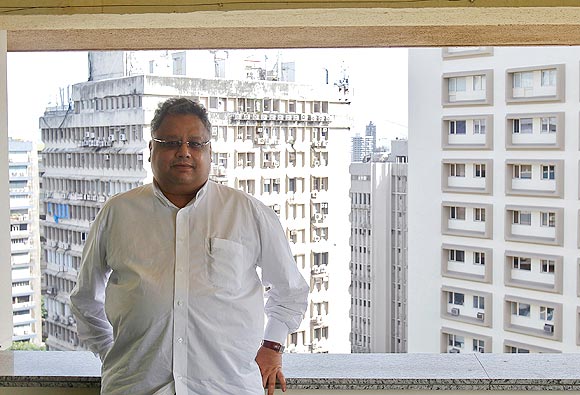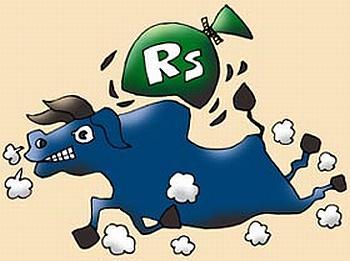Photographs: Vivek Prakash/Reuters A V Suresh
Follow these principles if you want to become a billionaire like him.
Rakesh Jhunjhunwala is a qualified CA and has chosen trading in stocks as his profession. Many consider him as the Indian version of Warren Buffet.
He is also sometimes referred to as 'The Golden Hand' of Indian stock market. People believe that everything he touches (invests) turns to gold.
Such is his popularity that there are people who track his portfolio and invest in the same companies that he invests.
So, what's his secret of success? What are his investment strategies which have made him a billionaire? Let's see what we can learn from him.
Buy for long term
Though he is investing in the stock market, he is not a short term trader. He invests in stocks for the long term. And this strategy has paid off for him. Some of the stocks he owns have multiplied his wealth over the years.
Had he sold them the moment they appreciated by 10-20 per cent, we wouldn't have been talking about him now.
7 investment lessons from Rakesh Jhunjhunwala
Photographs: Dominic Xavier/Rediff.com
Belief in India's growth story
He is one of those guys who believes strongly in India's growth story. He says again and again that Indian economy will keep growing. So, be a part of it.
The only way you can be a part of a growing India is to invest in its stock market. If you are investing in debt instruments like fixed deposits or bonds, you will not be able to reap multifold returns by any means.
Kindly click NEXT to continue
7 investment lessons from Rakesh Jhunjhunwala
Photographs: Dominic Xavier/Rediff.com
Search for value
Rakesh Jhunjhunwala believes in value oriented companies. He has his team who helps him in finding companies which offer value in the long term.
If the stock prices of these companies are higher now, he tends to wait a bit, but finally gets his hands on them.
Before buying a stock, he closely studies its management style, growth potential, competitive nature and many more factors.
Kindly click NEXT to continue
7 investment lessons from Rakesh Jhunjhunwala
Photographs: Dominic Xavier/Rediff.com
One cannot create wealth through free advice
In an interview given to Mumbai Mirror, he has said that one cannot make wealth through borrowed advice.
You need to do your own research before making any investment. Free advice can actually cost you later.
If you blindly follow someone's free advice, you might not be paying them anything now but you will realise later when those investment turn out to be duds. That loss can be a lot more than the fees that you pay for an expert's advise.
Kindly click NEXT to continue
7 investment lessons from Rakesh Jhunjhunwala
Photographs: Uttam Ghosh/Rediff.com
Invest only in what you know
He invests only in companies whose business he can understand.
He does not opt for complex businesses.
'Keep it simple' is his strategy when it comes to investing.
Kindly click NEXT to continue
7 investment lessons from Rakesh Jhunjhunwala
Photographs: Uttam Ghosh/Rediff.com
Consistency
If it's done once, it could be a lottery. But if it's done again and again, we call it consistency. This is what Rakesh Jhunjhunwala is known for.
He consistently invests in the stock market irrespective of the conditions. The quantum or strategy of investing can differ based on those conditions but he has never left his belief that stock market will always deliver for you if you do everything right.
Kindly click NEXT to continue
7 investment lessons from Rakesh Jhunjhunwala
Photographs: Dominic Xavier/Rediff.com
Success comes from failure
It's not that he has not tasted failure. Some of his investments have also been duds.
He believes that success springs out of failures. If you fail, instead of crying over it you should know why you have failed. Did you not read the business well? Were the markets hit by some bad news?
These are some questions whose answers he wants you to search.









Comment
article